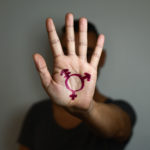Liberalism is a theory. Conservatism, in contrast, is the posture of defending things as they’re given to us. So conservatives will often detect changes to our culture, language, and laws, and sometimes even aptly describe the change’s character. But because they’re not by nature philosophical people—the society we’re given isn’t one theory made concrete, but a mess of conflicting ideas and straight-up accidents—conservatives often can’t articulate, much less thoughtfully resist or reverse, the ultimate tendency of the worldview they stand athwart yelling “stop!”
When the Department of Health of Human Services replaced “mothers” with “birthing people” in parts of its 2022 budget proposal, prominent conservatives noticed something amiss, but they still haven’t quite worked out what. Questioning HHS Secretary Xavier Becerra, Senator James Lankford sounded like a frustrated therapist: “Would you at least admit calling a mom a ‘birthing person’ could be offensive to some moms?” Christine Rosen did better, repurposing leftist jargon to slug the “supposedly ‘inclusive’ efforts [that] erase women and mothers.”
It does seem pretty obvious that all but a few mothers have seen birth as distinctive to their biological sex and so could take offense to the new language. But the HHS word-change presages a more serious intellectual and perhaps legal threat: dissolving the basis on which mothers claim custody over their children. If a mother is just a birthing person, a mere channel introducing into the world an otherwise rootless individual, then a mother’s child is not hers in any morally thick sense. If children are raised to believe parental authority is arbitrary, and if lawyers and policymakers ingest the same vision, then the rich network of claims and duties binding parents to children will become publicly unintelligible. Those interested in defending parenthood should explain its basis, rather than just sputtering their umbrage at the latest progressive assault on our language and thought.
The Intimacy of the Parent-Child Bond
Start your day with Public Discourse
Sign up and get our daily essays sent straight to your inbox.Children are their parents’ flesh, literally and essentially, from conception. The child embodies the carnal union of its mother and father. This is the splendid double meaning of Scripture’s teaching that man and woman “become one flesh” in marriage. So babies in utero have a double status: they are created from (and in the case of mothers, they are created in) their parents’ very selves. And they are also distinct persons who develop, circumstances permitting, according to principles of internal direction. Because constituted of parental flesh, children belong to parents. There is hardly a better ground for belonging in some sense. But as persons with incipient rational natures, children cannot belong as, say, property does. What is best for children, and therefore what parenthood is for, is the development of the child’s powers to the end of fruitful living free of parental guidance.
So conception, not birth, is the original moment in a child’s life and dependence on parents. But genealogy is not the only basis for parental authority. Children cannot rear themselves, but being reared is in their interest, and so the parent’s wise and ongoing governance is itself a source of parental claims over children.
In her superb article on parent-child relations, Melissa Moschella observes that “human persons have a very long period of gestation. Physical birth ends only with the first and shortest period” thereof. In other words, gestation, rightly viewed, continues with (progressively fewer) acts of fortifying the child’s powers, which direct the child’s life toward the goods common to us all. Take feeding as an example. At first, the child eats when its mother does. The feeding continues postpartum with nursing, then via spoon, then with coaxing or a stern look, and eventually, mother or father will just announce dinner, and the youngster does the rest. And so on with countless other acts of care, from keeping the child clean to socializing her with siblings, peers, and adults.
If these acts of parental care, and the million deliberations before them, are not forthcoming, the child will grow up rude, violent, scared, sad . . . in short, incapable of self-governance, let alone fruitful living with others. The regularity of care and resultant trust give the child a claim on these parents. The sacrifices made and knowledge gained from the ordeal of caring for the child, which begins in the womb and continues outside it, position parents better than anyone to care for this particular child.
Obviously, the claims of parents are not absolute. Incompetent parents deserve input and direction from concerned family, friends, and clergy. Abused children deserve to be with those who will promote their welfare, not harm it. Interventions should be proportional and subsidiary. Given the irreplaceable connection between parent and child, those looking to help should assist parents to parent well. Where it’s possible to guide rather than supplant parents, extra intrusion violates the parents’ practical reasonableness: using one’s powers to direct one’s life and the lives of dependents. Where parents are competent or can be supported toward competence—and given the numerous ways it’s possible to parent morally, the range of options is quite wide—the claims of parents are usually decisive. In standard cases, no one else’s come close. Given the benefits of unified authority—and divided authority is especially bad for children—the parents’ superior claims to rear exclude others from larger than supporting roles.
Ineluctably Sexed, Radically Dependent, and Mortal
Motherhood is (like fatherhood) sourced in biology, but not exhausted by it. It’s a thickly normative office. You can be a better or a worse mother, dutiful in your maternal obligations or negligent of them. In Moschella’s excellent phrasing, “To conceive a child is, in one sense, to already be a parent, but in another very real sense, it is to begin to be a parent . . . once one begins to be a parent one is obligated to continue to act as such unless there are serious child-centered reasons for not doing so.” What would it even mean, by contrast, to be a good birthing person, or to act like one? The nomenclature refers to an hours-long event, and indicates no deeper prior bond, nor any relationship to follow.
It makes perfect sense that liberals (consciously or not) are reducing the connection between mother and child to the moment of birth. Birth emancipates child from the physical sovereignty of its mother and disburdens mother of a useless, needy dependent. That motherhood and childhood begin in pregnancy is highly embarrassing to liberal anthropology. The physical and genealogical dependence of children on their parents attacks the thesis that we are isolated individuals rather than members of families that precede and survive us. If mothers are mere vehicles for the production of unrelated beings, then their link to children is weak indeed. Certainly it cannot support anything like the moral weight of family life, rightly ordered.
Liberalism hates unchosen obligations, because liberalism hates unchosen everything. Where the obligation in question is grounded in our natural constitutions—to have other parents is simply to be someone else—the obligation is more hateful to liberalism still. For modern liberals, the court of final moral appeal is to a private self or identity composed of present whims and beliefs. Human biology resists this radical interiority and bias toward the present. For we did not make ourselves. We are who we are in large part because our parents are who they are. We are ineluctably sexed, radically dependent, and mortal. Our genes encode past generations, and the material therein survives us embodied in those we ourselves generate.
The Working Out of Liberalism
The proposition that mothers are birthing people may seem uniquely absurd. But it’s quite congruous with liberalism’s other prescriptions for man and woman and child. Abortion without restriction, the celebration of infidelity (reaching its nadir in the “open relationship”), hook-up culture, ubiquitous pornography and its inclusion in sex-ed for kids. A dozen other means of divorcing sex from marriage, marriage from children, and children from childrearing. Any of these measures alone is harmful, to children more than to adults and to women more than to men. Taken all together, they are the working out of a liberal logic abominating embodied personhood that is as consistently brutal as it is brutally consistent.
Right now, the effect of “birthing people” and similar language in legislation probably will be to police the speech of federal employees and those who receive federal funding. Not good. But why think that’s the end? The newspeak may spread to other laws, our culture, school curricula, medical training, and social work. Imagine a generation of children raised to believe their parents rule arbitrarily, having no connection that endures past the moment of birth. Why would a child so taught suffer the commands of mom and dad? Imagine a generation of lawyers and judges educated to believe the same. Why would they allow youngsters to remain tyrannized by the caprices of birthing people and (I dunno) sperm bearers? And why would young adults who might otherwise raise families feel any obligation to the human beings their bodies disgorge? Wouldn’t infants be better off pursuing their own desires in some publicly funded kids’ version of Huxley’s World State? Why, in short, would anyone choose motherhood in a society that holds motherhood in contempt?
This all sounds fanciful and apocalyptic, the stuff of cheap rightwing talk radio. I hope it is fanciful. If it is, it will be despite liberalism, which is already producing generations whose lives will be solitary, decadent, anxious, angry, and long.














